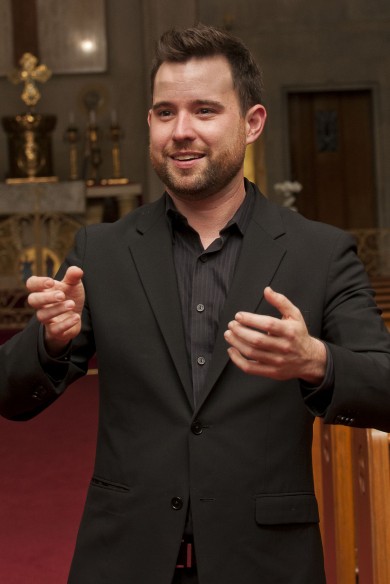Seraphic Fire explores Mozart and his influential predecessors

Patrick Quigley led Seraphic Fire in the program “Ave Verum Corpus” Wednesday night at St. Sophia’s Greek Orthodox Church in Miami.
Ever wonder how a musical genius is made?
Seraphic Fire’s current program examines young Wolfgang Amadeus Mozart’s compositional development, featuring sacred works appropriate for the Lenten season that may have influenced his famous motet Ave verum corpus. Over ninety minutes, Seraphic travels through a variety of Renaissance, Baroque and Classical works from Italy, Salzburg, Dresden, and Berlin in a trajectory from intimacy to grandeur.
For each program, artistic director Patrick Dupré Quigley constructs his desired sound from his arsenal of singers. Wednesday’s blend of mid-range power penetrated energetically in Miami’s St. Sophia’s Greek Orthodox Church’s ravishing space.
Joined by early-music orchestra, The Sebastians, Seraphic opened with Mozart’s Ave verum corpus in a tangy blend of period instruments and bright voices hanging pleasantly mid-air.
However, nothing else followed the printed program order, numerous works were cut, and several substitutions made, frustrating the audience’s attempts to follow translations. While Quigley’s reordering supported Mozart’s chronological development, corrected inserts should be made available for the remaining concerts.
Seraphic’s first stop was Italy, with warm polyphony characterizing Palestrina’s Sicut Cervus, and a corporate boy soprano sound for Victoria’s O Magnum Mysterium. Vivaldi’s Nulla in mundo pax was cut to just one aria. Accompanied by the Sebastians’ strings, cello, organ and theorbo (a supersized lute), soprano Molly Quinn’s radiant upper range shone, but her lower range evaporated, a problem evident with most of the evening’s soloists.
Mozart’s student days in Salzburg were captured by two substitutions and a Partita. Surge Jerusalem by Mozart’s teacher Martini channeled Renaissance counterpoint, while in Mozart’s Italianate Venite populi, the driving strings captured Classical exuberance while foreshadowing his later dramatic chromaticism.
The Sebastians took center stage for Salzburg composer Heinrich Ignaz Franz Biber’s Partita No. 6 for 2 Violins and Continuo. Violinist Nicholas DiEugenio promisingly called Biber the “Jimi Hendrix of the violin,” but blistering arpeggiandos and scales couldn’t overcome a lack of melodic motion, with over-doubled basses and harmonic drones weighing the composition down. Other works on the program offered a better showcase for The Sebastians’ collective brilliance.
If he was lucky, Mozart encountered Czech Jan Dismas Zelenka during his Austro-Hungarian travels. Zelenka’s Miserere in C minor received a commanding performance by a supercharged Seraphic over the Sebastians’ rich winds and strings. Pungent harmonies and suspensions in the opening and closing “Miserere” had deep emotional impact, along with the introspective “Gloria Patri” and “Sicut Erat” movements. A missing second “Miserere” would have been welcome.
Quigley wisely moved six powerful Bach cantata excerpts to the end of the concert. The chorus, “Nun komm, der Heiden Heiland” from BWV 62 was marked by the haunting vocal quality of the Sebastians’ reeds within Quigley’s robust interpretation and shining alto melodies. Countertenor Michael Wisdom showed flexibility on Bach’s demanding “Ich wünsche nur bei Gott zu leben” from Geist und Seele wird verwirret, BWV 35, and alto Virginia Warnken captured the affirmative text of Bekennen will ich seinen Namen, BWV 200, playfully trading string melodies.
Bach’s chorus “Bleib bei uns, den es will Abend werden” from BWV 6 eclipsed everything heard previously. Greater than the sum of twelve parts, Seraphic’s unified slow counterpoint allowed the touchingly penitential text to be heard clearly.
Only Bach’s joyous “Ehre sei dir, Gott, gensungen,” BWV 248-V had greater impact. Although some orchestral detail was lost in the venue, Quigley’s differentiation of text through dynamics and vocal color brought clarity to extremely thick textures. A formidable sound, especially from the men, brought the night to an uplifting close.
The program will be repeated 7:30 p.m. Friday, at St. Philip’s Episcopal Church, Coral Gables; 8 p.m. Saturday at All Saints Episcopal Church, Fort Lauderdale; and 4 p.m. Sunday at All Souls Episcopal Church, Miami Beach. seraphicfire.org; 305-285-9060.
An additional performance will be presented by St. Mark’s Episcopal Church 7:30 p.m. Thursday in Palm Beach Gardens. Tickets for this performance can only be purchased directly from St. Mark’s at 561-622-0956.
Posted in Performances
Leave a Comment
Thu Mar 12, 2015
at 1:07 pm
No Comments






